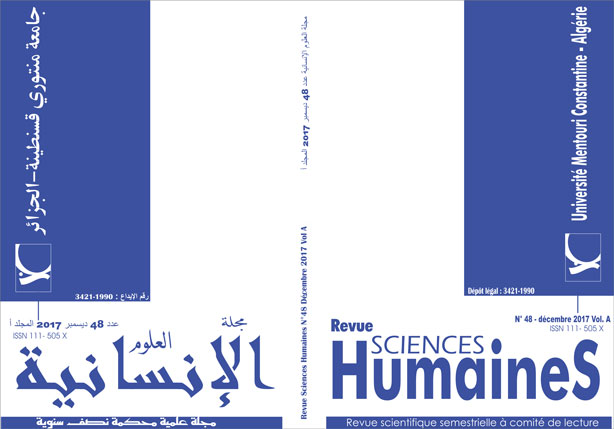Investigating the Strategies Used to Translate English Advertisement Slogans into Arabic
الكلمات المفتاحية:
translation، non-literary text، advertisements’ translation، strategies، advertisement slogansالملخص
This paper deals with a text-specific translation. It covers the translation of a non-literary text which falls under the subject field of marketing. It aims at investigating the translation strategies used in the translation of advertisements as a recent orientation in the field of translation, which is advertisements’ translation. The paper is composed of a theoretical aspect and a practical one. The theoretical aspect, introduces an overview of translation (translation studies) notably; specialised translation, the translation of a text-specific nature in the field of advertising is, then, introduced and defined, as well as the translation strategies and techniques used for rendering this type of items. In the practical aspect, the translation strategies used to render English advertisement slogans into Arabic are investigated by means of a corpus of English slogans (comparable component) with their Arabic counterparts (parallel component). Their analysis is conducted to provide information about thequantity (frequency of the translation methods used in this context) and quality of these translating methods.التنزيلات
المراجع
Abu-Shehab, Nahedah Hashim. Translating Brochures Advertising Personal Care Products from English into Arabic: Strategies and Linguistic Inaccuracy.An-Najah National University, Faculty of Graduate Studies, 2011: 64-71.
Anholt, Simon. Another One Bites the Grass. Making Sense of International Advertising, John Wiley & Sons: New York, 2000: 5.
Arens et al. Contemporary Advertising. McGraw- Hill: Irwin, 2009: 366.
Armasar, Ioana-Paula. Apects of Specialized Translations in the Field of Economics. Bulletin of the Transilvania University of Braşov Series V: Economic Sciences. Vol. 7, 2014: 251.
Bullmore in de Mooij, M. Global Marketing and Advertising: Understanding Cultural Paradoxes. Thousand Oaks, CA: Sage, 1998: 33.
Dan, Lavinia (Nădrag).Techniques for the Translation of Advertising Slogans. Arhipelag XXI Press, Tîrgu Mureș, “Ovidius” University of Constanța, 2015: 13.
De Mooij, M. Translating Advertising, Painting the Tip of an Iceberg. The Translator. Volume 10, 2004: 181,188.
-----. Global Marketing and Advertising: Understanding Cultural Paradoxes. Thousand Oaks: SAGE Publications, Inc, 2005:37.
Fiola, M. Should the Market Dictate the Content of Specialized Translation Curricula? Connexions, international professional communication journal, Ryerson University, 2013: 59.
Gibová.k. Translation Procedures in the Non-literary and Literary Text Compared (based on an analysis of an EU institutional-legal text and novel excerpt “The Shack” by William P. Young). University of Presov Faculty of Arts Institute of British and American Studies, 2012: 18.
Holmes, James, S. “The Name and Nature of Translation Studies”. The Translation Studies Reader. Ed. Lawrence Venuti, second ed. Routledge, 2000: 173.
Munday, J. The Routledge Companion to Translation Studies. Routledge: Oxon, 2009: 9-10.
Leiss, W.K.S. and Jhally. Social Communication in advertising: persons, products, and images of well being. Metheun: New York, 1986: 7.
Levitt, T. The Globalization of Markets. Harvard Business School Reprint, 1983: 2.
Munday, J.Advertising: Some Challenges to Translation Theory. The Translator
Volume 10, 2004: 199.
Popovič, A. The Nature of Translation. Essays on the Theory and Practice of literary Translation. The Hague: Mouton, 1977: 192.
Shimp, T. E. Advertising. Promotion and Supplemental Aspects of Integrated Marketing Communication, 4th Edition. The Dryden Press: Fort Worth, Texas, 1997:119.
Valdés Rodríguez, M. Cristina. Creativity in Advertising Translation. Universidad de Oviedo. Quaderns de Filologia, Estudis literaris, Vol. XIII ,2008: 38.
Wells et al. Advertising: Principles and Practice. Prentice – Hall: New Jersey, 2000: 326.
















